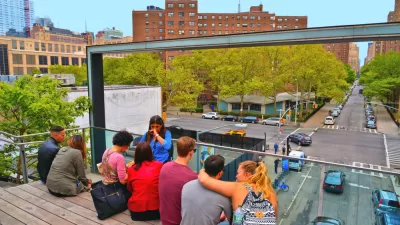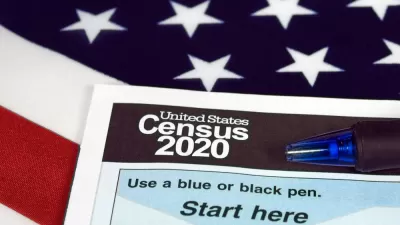There are a number of obstacles and issues related to the 2020 Census enumeration of apartment building residents. This set of FAQs covers “Census Information for Rental Property Owners.”

There are a number of obstacles and issues related to the 2020 Census enumeration of apartment building residents. This set of FAQs covers “Census Information for Rental Property Owners.”
Landlords and building managers need to know:
Why is the Census important?
Census data guide distribution of government resources, services and infrastructure investment. Every year, billions of dollars from the federal budget are distributed to communities — for education, transportation, housing and health — with amounts determined from population data.
How does the Census work? When does it happen?
By April 1, 2020, all residential addresses will receive 2020 Census materials in the mail. Residents should fill out their Census questionnaire as soon as possible, either online or by mail. Both forms of responses are accepted.
The 2020 Census is not something that households can ignore. Residents who do not respond to the first mailing will receive four additional mailings.
Starting in May, Census workers will begin calling on addresses that continue to have a “non-responding” status. These follow-up visits will take place through August 2020.
What if an occupied apartment or unit does not receive any Census materials?
Landlords and building managers can assist the 2020 Census by letting residents know that Census materials should arrive by April 1, 2020. If not, people can still complete the 2020 Census through a secure, online questionnaire at 2020census.gov.
Who needs to be counted in my apartment building?
Everyone counts — and the Census Bureau wants to count everyone at the right place. The general rule: People should report themselves living at their usual place of residence.
How can you verify that someone is a Census worker?
Landlords and building managers should always verify that Census workers have a photo ID badge. The badge will have the Census worker’s name, photograph, and a US Department of Commerce watermark.
If you still have questions, you can call the Census Bureau at 800-923-8282.
What might a Census worker ask of a landlord or building manager?
Mostly, Census workers will need to enter building hallways, knock on apartment doors, or buzz apartment call boxes. They will ask whether addresses on their lists were occupied or vacant on April 1, 2020.
Census workers may ask for residents’ names, phone numbers and usual hours at home. Landlords and building managers must cooperate and provide known information if Census workers ask.
If Census workers are unsuccessful communicating with residents, they may ask detailed questions about who lives in specific units, their names, relationships to one another, races and ages. The Census Bureau considers response by a landlord to be a last resort — but it is a valid request if contact with residents has failed.
Is answering the Census required?
Participation in the Census is required by federal law. Census workers are empowered by federal law to ask for any of the information listed on the Census questionnaire (13 U.S.C. § 221 and 223). They do not need a court order for this work.
Are there privacy issues to consider?
Providing information to Census workers is not a violation of anyone’s privacy rights. Federal law requires that landlords and building managers cooperate to the extent they are able.
Federal law also requires that landlords or building managers provide reasonable access to buildings. If a person refuses to cooperate, refuses access, or otherwise impedes a Census worker, the Census Bureau can take legal action. Refusing to provide information or impeding a Census worker is a federal offense that can lead to a fine of up to $500.
What do the Census Bureau and federal law consider to be reasonable access to buildings?
Landlords and building managers must allow Census workers to walk through hallways, knock on apartment doors, or buzz apartment call boxes. Census workers will need time and space to conduct interviews. Census workers may have to return multiple times to secure interviews. These repeat visits must be accommodated.
FULL STORY: HRA Owner/Landlord Information: Census Information for Rental Property Owners

Planetizen Federal Action Tracker
A weekly monitor of how Trump’s orders and actions are impacting planners and planning in America.

Map: Where Senate Republicans Want to Sell Your Public Lands
For public land advocates, the Senate Republicans’ proposal to sell millions of acres of public land in the West is “the biggest fight of their careers.”

Restaurant Patios Were a Pandemic Win — Why Were They so Hard to Keep?
Social distancing requirements and changes in travel patterns prompted cities to pilot new uses for street and sidewalk space. Then it got complicated.

California Homeless Arrests, Citations Spike After Ruling
An investigation reveals that anti-homeless actions increased up to 500% after Grants Pass v. Johnson — even in cities claiming no policy change.

Albuquerque Route 66 Motels Become Affordable Housing
A $4 million city fund is incentivizing developers to breathe new life into derelict midcentury motels.

DC Area County Eliminates Bus Fares
Montgomery County joins a growing trend of making transit free.
Urban Design for Planners 1: Software Tools
This six-course series explores essential urban design concepts using open source software and equips planners with the tools they need to participate fully in the urban design process.
Planning for Universal Design
Learn the tools for implementing Universal Design in planning regulations.
Heyer Gruel & Associates PA
JM Goldson LLC
Custer County Colorado
City of Camden Redevelopment Agency
City of Astoria
Transportation Research & Education Center (TREC) at Portland State University
Camden Redevelopment Agency
City of Claremont
Municipality of Princeton (NJ)





























